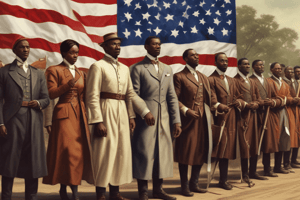Podcast
Questions and Answers
Match the following terms with their definitions related to Reconstruction:
Match the following terms with their definitions related to Reconstruction:
Fourteenth Amendment = Granted citizenship and equal protection under the law Fifteenth Amendment = Prohibited voting discrimination based on race Ku Klux Klan = Secret society aimed at maintaining white supremacy Reconstruction Governments = Temporary governments established to rebuild the South
Match the following figures with their roles during Reconstruction:
Match the following figures with their roles during Reconstruction:
President Johnson = Led the initial Reconstruction efforts Republicans in Congress = Took control of Reconstruction due to Southern opposition African Americans = Sought freedom and equality during Reconstruction Southern Leadership = Returned to power and resisted Radical Reconstruction
Match the following events with their outcomes or significance during Reconstruction:
Match the following events with their outcomes or significance during Reconstruction:
Reconstruction Begins = Set the stage for rebuilding the Union Congress Takes Control of Reconstruction = Implemented more stringent measures against the South Reconstruction Ends = Led to the rise of Jim Crow laws Rebuilding Southern Industry = Aimed to diversify the economy beyond agriculture
Match the following amendments with the rights they addressed:
Match the following amendments with the rights they addressed:
Match the following Reconstruction policies with their descriptions:
Match the following Reconstruction policies with their descriptions:
Match the following obstacles with the challenges faced by African Americans during Reconstruction:
Match the following obstacles with the challenges faced by African Americans during Reconstruction:
Match the following timelines with their key actions during Reconstruction:
Match the following timelines with their key actions during Reconstruction:
Match the following groups with their perspectives during the Reconstruction era:
Match the following groups with their perspectives during the Reconstruction era:
Study Notes
Reconstruction Overview
- Reconstruction aimed to address the myriad of challenges faced in reuniting and rebuilding the nation after the Civil War.
- Key issues included re-integrating Southern states, defining citizenship rights for freed slaves, and restoring the economy.
Freedom for African Americans
- The period marked significant shifts in social dynamics, particularly for African Americans, who gained legal rights through amendments.
- Efforts included the establishment of schools for freed slaves and initiatives to acquire land, although results varied widely.
President Johnson's Reconstruction Plan
- Johnson's plan was lenient towards the South, focusing on rapid restoration of states rather than ensuring civil rights for African Americans.
- The plan faced strong opposition from Radical Republicans in Congress, who felt it undermined the achievements of the war.
Opposition to President Johnson
- Johnson faced severe backlash from Congress due to his lenient measures and failure to enforce civil rights protections.
- This conflict ultimately led to Johnson's impeachment, highlighting deep political divisions during Reconstruction.
Fourteenth Amendment
- Ratified in 1868, it granted citizenship to all persons born or naturalized in the U.S. and ensured equal protection under the law.
- It aimed to curb the power of Southern states to disenfranchise African Americans and reinforced the federal government’s role in protecting rights.
Congress Takes Control of Reconstruction
- Congress, led by Radical Republicans, assumed control over Reconstruction, introducing more stringent measures to ensure civil rights and rebuilding efforts.
- This included military enforcement in the South to maintain order and protect freedmen's rights.
Fifteenth Amendment
- Ratified in 1870, it prohibited denying the right to vote based on race, color, or previous condition of servitude.
- Despite this, various discriminatory tactics, such as literacy tests and poll taxes, emerged to suppress African American voting.
Reconstruction Governments
- Southern states implemented new governments aimed at integrating freedmen into political life, although they often faced violent opposition.
- The dynamics created a tumultuous political landscape, with African Americans participating in governance for the first time.
Ku Klux Klan
- This secretive organization emerged as a violent reaction to Reconstruction efforts, targeting African Americans and their allies.
- The Klan employed intimidation and violence to undermine African American civil rights and disrupt Reconstruction efforts.
Reconstruction Ends
- As federal troops withdrew from the South, the progress made during Reconstruction faced severe backlash, leading to the rise of Jim Crow laws and segregation.
- The end of Reconstruction marked a significant setback for African American rights, reversing many gains achieved in the preceding years.
Rebuilding Southern Industry
- Efforts to revitalize the Southern economy included promoting new industries and infrastructure but often prioritized the interests of white landowners.
- Sharecropping became prevalent, trapping many African Americans in cycles of debt and poverty.
Reconstruction in the North
- The North witnessed a shift in political focus post-Reconstruction, with industrial growth and immigration reshaping its social landscape.
- However, the legacy of Reconstruction continued to influence Northern attitudes toward race and civil rights activists in the years to follow.
Studying That Suits You
Use AI to generate personalized quizzes and flashcards to suit your learning preferences.
Description
This quiz covers the Reconstruction era post-Civil War, focusing on the re-integration of Southern states and the civil rights of freed slaves. Key topics include President Johnson's lenient policies and the resistance from Radical Republicans. Test your knowledge on the social and economic impacts of this pivotal period in American history.




